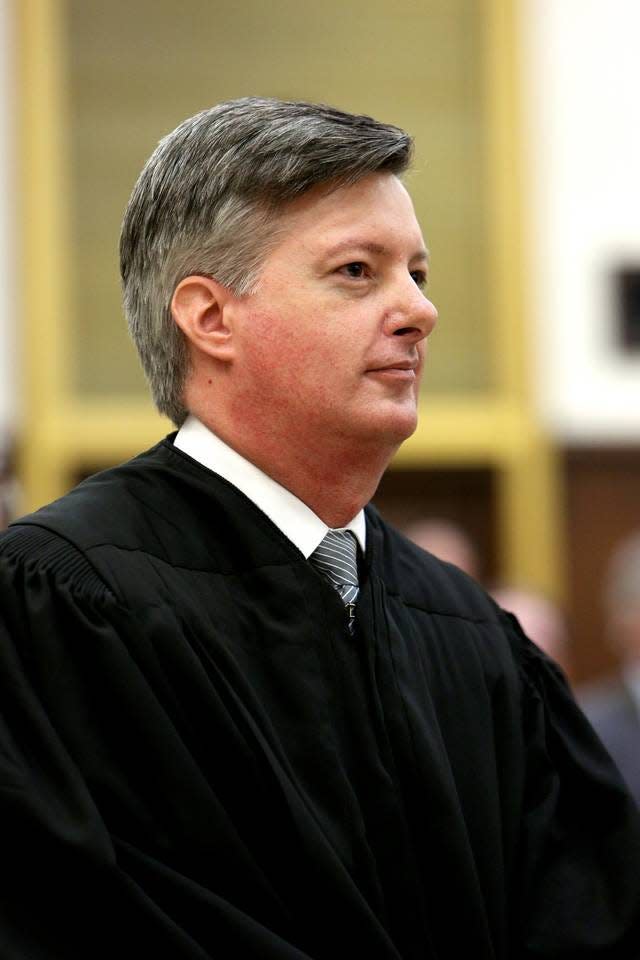Groups challenging 'critical race theory' ban grow impatient, push judge on stalled lawsuit
- Oops!Something went wrong.Please try again later.
Educators, students and civil rights groups challenging a law in Oklahoma barring the teaching of “critical race theory” are urging a federal judge to take action in their two-year-old lawsuit, saying teachers are in their third year of self-censoring and students are being deprived of a “culturally inclusive education.”
In a motion filed in late September, the groups suing the state said the request for an injunction blocking enforcement of the law, known as House Bill 1775, had been pending for nearly two years and all written arguments from both sides regarding the injunction had been filed 19 months ago.
Moreover, a request in August for a conference to discuss the status of various motions has gone unanswered, they said.
Meanwhile, state leaders and education officials “continue to investigate school districts and enforce HB 1775 for activities such as training teachers on how to avoid being racially biased against students,” attorneys for the students and educators said.
“These actions have put educators on notice that the State will continue to enforce HB 1775 to its fullest extent and educators must tread lightly or else face losing their licenses. As a result, Oklahoma students continue to be deprived of access to curricula reflecting diverse perspectives, ideas, and lessons related to a culturally inclusive education, and information that is crucial for building analytical skills and fostering cognitive development.”
What to know about US District Judge Charles B. Goodwin, overseeing critical race theory lawsuit
U.S. District Judge Charles B. Goodwin is overseeing the case in Oklahoma City. Goodwin, who was nominated by former President Donald Trump, was confirmed in 2018 despite receiving a rare rating of “unqualified” from the American Bar Association’s judicial rating committee.
A former chair of the committee said Goodwin’s work habits as a federal magistrate, “including his frequent absence from the courthouse until mid-afternoon, raised doubt for a majority of the standing committee's members with respect to Magistrate Judge Goodwin's ability to fulfill the demands of a federal judge."
Goodwin told the Senate Judiciary Committee in 2017, when he was a magistrate, that he often worked from home when he was writing opinions and that he was shocked and disappointed by the ABA’s rating. Goodwin was defended at the time by others, including his former boss, District Judge Joe Heaton.
In their motion last month urging Goodwin to act, the parties suing the state said they had two choices at this point — ask him to move the case along or go to the 10th U.S. Circuit Court of Appeals.
“Accordingly, Plaintiffs are seeking relief from this Court before raising this issue with the Tenth Circuit,” they said.
More: Why you should read these 51 banned books now
What does Oklahoma House Bill 1775 ban?
House Bill 1775 was approved by the Oklahoma Legislature and signed into law by Gov. Kevin Stitt in 2021.
The law bans the teaching in public schools of eight “concepts” taken verbatim from an executive order issued in 2020 by former President Donald Trump. Among the prohibited concepts are:
● One race or sex is inherently superior to another race or sex;
● An individual, by virtue of their race or sex, is inherently racist, sexist or oppressive, whether consciously or unconsciously;
● An individual, by virtue of their race or sex, bears responsibility for actions committed in the past by other members of the same race or sex;
● Any individual should feel discomfort, guilt, anguish or any other form of psychological distress on account of their race or sex; and
● Meritocracy or traits such as a hard work ethic are racist or sexist or were created by members of a particular race to oppress members of another race.

The state Board of Education adopted emergency rules to implement the law, which includes the right of a private citizen to sue over perceived violations.
The American Civil Liberties Union, ACLU Oklahoma and attorneys for other groups filed the federal lawsuit in Oklahoma City in October 2021, saying it was the first legal challenge to laws targeting so-called “critical race theory.” At the time, the groups said, eight states had approved similar laws.
The challenge claims the law violates the First and Fourteenth amendments to the U.S. Constitution by stifling speech and discriminating against minority and LGBTQ+ students.
More: Black history is under attack across US from AP African American Studies to ‘Ruby Bridges’
In their latest motion to get the case moving, attorneys for the students and educators said the “need for clarity on this law remains as great as ever. Without this clarity, Oklahoma teachers and professors are obligated to self-censor their instruction, removing lessons related to racism, sexism, and implicit bias for fear of incurring the harsh penalties of the law’s implementing regulations.”
Oklahoma Attorney General Gentner Drummond is defending the law. His solicitor general told the judge earlier this year that he should dismiss the case because the law is “succinct, straightforward, and narrowly phrased. It does not impede academic freedom, and it is not overbroad.
“This Court should decline Plaintiffs’ invitation to overturn Oklahoma’s democratic and representative political process. It should instead dismiss the case for failure to state a plausible claim.”
This article originally appeared on Oklahoman: Lawsuit on critical race theory ban in Oklahoma stalled, advocates say

